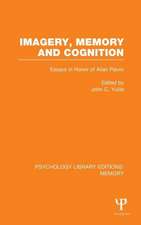Investigative Psychology – Offender Profiling and the Analysis of Criminal Action
Autor D Canteren Limba Engleză Paperback – 24 sep 2009
- The full range of crimes from fraud to terrorism, including burglary, serial killing, arson, rape, and organised crime
- Important methodologies including multi–dimensional scaling and the Radex approach as well as Social Network Analysis
- Geographical Offender Profiling, supported by detailed analysis of the underlying psychological processes that make this such a valuable investigative decision support tool
- The full range of investigative activities, including effective information collection, detecting deception and the development of decision support systems.
Preț: 379.45 lei
Nou
72.62€ • 75.53$ • 59.95£
Carte disponibilă
Livrare economică 22 martie-05 aprilie
Livrare express 08-14 martie pentru 51.08 lei
Specificații
ISBN-10: 047002397X
Pagini: 486
Dimensiuni: 170 x 244 x 26 mm
Greutate: 0.82 kg
Ediția:Reprint.
Editura: Wiley
Locul publicării:Chichester, United Kingdom
Public țintă
Final year undergraduate and postgraduate students in forensic/investigative/criminal psychology, criminology, and deviance; professional trainees in police, probation, and crime analysis.Descriere
Until the development of Investigative Psychology, profiling was based on little more than the informed personal expertise of experienced detectives. Spearheaded by David Canter and his associates, the new discipline of Investigative Psychology has emerged out of a quarter century of research and involvement in many actual cases. This ground–breaking text is the first to provide a detailed overview of the field, from the earliest work through to recent studies, including descriptions of previously unpublished internal reports. Crucially it provides a framework for students to explore this exciting terrain, combining Narrative Theory and an Action Systems framework. It includes empirically tested models for Offender Profiling and guidance for investigations, as well as an agenda for research in Investigative Psychology.
Investigative Psychology features:
- The full range of crimes from fraud to terrorism, including burglary, serial killing, arson, rape, and organised crime.
- Important methodologies including multi–dimensional scaling and the Radex approach as well as Social Network Analysis.
- Geographical Offender Profiling, supported by detailed analysis of the underlying psychological processes that make this such a valuable investigative decision support tool.
- The full range of investigative activities, including effective information collection, detecting deception and the development of decision support systems.
In effect, this text introduces an exciting new paradigm for a wide range of psychological contributions to all forms of investigation within and outside of law enforcement. Each chapter has actual cases and quotations from offenders and ends with questions for discussion and research, making this a valuable text for undergraduate and postgraduate courses in Applied and Forensic Psychology, Criminology, Socio–Legal Studies and related disciplines.
Visit the companion website at www.wileyeurope.com/college/canter for teaching resources and student resources on research methodologies linked to the book.
Textul de pe ultima copertă
Until the development of Investigative Psychology, profiling was based on little more than the informed personal expertise of experienced detectives. Spearheaded by David Canter and his associates, the new discipline of Investigative Psychology has emerged out of a quarter century of research and involvement in many actual cases. This ground–breaking text is the first to provide a detailed overview of the field, from the earliest work through to recent studies, including descriptions of previously unpublished internal reports. Crucially it provides a framework for students to explore this exciting terrain, combining Narrative Theory and an Action Systems framework. It includes empirically tested models for Offender Profiling and guidance for investigations, as well as an agenda for research in Investigative Psychology.
Investigative Psychology features:
- The full range of crimes from fraud to terrorism, including burglary, serial killing, arson, rape, and organised crime.
- Important methodologies including multi–dimensional scaling and the Radex approach as well as Social Network Analysis.
- Geographical Offender Profiling, supported by detailed analysis of the underlying psychological processes that make this such a valuable investigative decision support tool.
- The full range of investigative activities, including effective information collection, detecting deception and the development of decision support systems.
In effect, this text introduces an exciting new paradigm for a wide range of psychological contributions to all forms of investigation within and outside of law enforcement. Each chapter has actual cases and quotations from offenders and ends with questions for discussion and research, making this a valuable text for undergraduate and postgraduate courses in Applied and Forensic Psychology, Criminology, Socio–Legal Studies and related disciplines.
Visit the companion website at www.wileyeurope.com/college/canter for teaching resources and student resources on research methodologies linked to the book.
Cuprins
Notă biografică
Professor David Canter and Dr Donna Youngs are both of the International Research Centre for Investigative Psychology (IRCIP), UK.




















